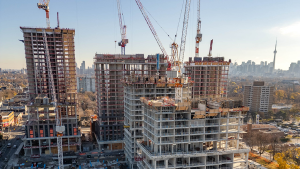OTTAWA — Housing starts in the Toronto Census Metropolitan Area (CMA) concluded 2022 at 45,109 units, 7.6 per cent higher than in the prior year, Canada Mortgage and Housing Corporation (CMHC) has reported.
The total marked the highest level since 2012 (48,105 units) and the fourth highest number on record. The growth in housing starts was entirely attributable to the multi-unit segment, comprised of semi-detached homes, row homes and apartments, stated a release.
There were 38,780 multi-unit starts in 2022 in Toronto, the largest number on record. The majority of these were apartments, of which most were condominiums.
Viewed through seasonally adjusted annual rate (SAAR) data, the monthly SAAR of total housing starts for all areas in Canada declined five per cent in December (248,625 units) compared to November (263,022 units). The SAAR of total urban starts also declined five per cent, with 227,708 units recorded in December.
Multi-unit urban starts nationally decreased four per cent to 182,850 units, while single-detached urban starts fell 11 per cent to 44,858 units.
Rural starts were estimated at a seasonally adjusted annual rate of 20,917 units.
The trend in housing starts was 269,930 units in December, down one per cent from 273,801 units in November. The trend measure is a six-month moving average of the monthly SAAR of housing starts.
The level of actual housing starts activity in the Montreal CMA was in line with pre-pandemic levels in 2022 with 24,000 housing starts, representing a decrease of 25 per cent compared to 2021. The level of housing starts in 2021 was nevertheless a 30-year record.
The decrease of Montreal housing starts was observed across all market types (homeowners, rentals, condos), with rental starts continuing to be the number one product built in the CMA, representing 61 per cent of all housing starts in that market.
“The 2022 year ended with a slight decline for both the monthly SAAR of housing starts and the trend at the national level in December,” said CMHC chief economist Bob Dugan in a statement. “However, Toronto, Montreal and Vancouver all posted increases in total SAAR housing starts, with Toronto posting a significant increase of 72 per cent in December.”
The rate of new construction continued at an elevated pace in 2022 overall, ending the year with actual total urban starts at 240,590 units (down one per cent) in Canada, similar to levels observed in 2021 (244,141 units), Dugan noted.
“While these additional units will provide much-needed supply on the market, demand for housing in the country will continue to grow.
“We need to find innovative ways to deliver more housing supply and keep building at a higher pace in the coming years in order to improve affordability.”











Recent Comments